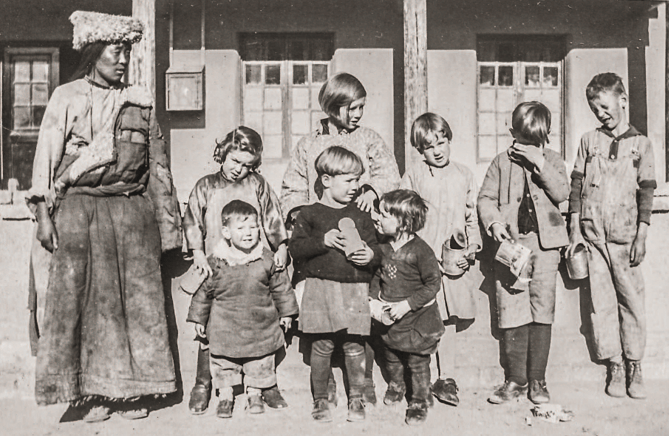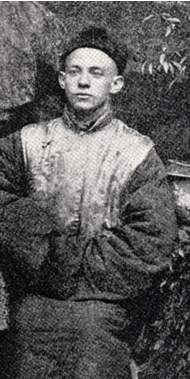1920s Tibetan work
Amdo ཨ་མདོ་

Missionary children and a Tibetan minder at the CMA retreat in Labrang, early 1930s.
The work in the Amdo areas of northern Tibet continued to advance, although each step forward seemed to be met by countless setbacks. The frequent turnover of missionaries caused the work to stagnate, with many choosing to go home after having invested years learning the Amdo language. Although a steady trickle of new recruits did arrive in the region, most soon gravitated toward the much easier Chinese work.
Discouragement and loneliness were the main reasons why so many workers abandoned Tibet. In 1938 Robert Ekvall lamented: "The Tibetans seem by all the forces of demonic influence, by all the powers of that ancient subtle faith, and by their own sinfulness, thrice sealed against the gospel. And for long years hope for the gospel to break forth among the Tibetans was a hope deferred."[i]
Those who patiently endured the challenges of life in Amdo often later experienced wonderful advances in the work. Vaughan Rees and his wife were CIM medical missionaries based in southern Gansu. In 1932, Rees was invited to visit the king of Ngawa in neighboring Sichuan Province. Sensing a great opportunity for the kingdom of God, Rees asked the experienced Ekvall family to travel with him and his co-workers across the Min Mountains. The Ekvalls enthusiastically agreed, and Rees reported:
"With tents, food, and all our movables on 12 yaks and our party of 11 mounted on horses, we set out from the Chinese border on June 3rd, and thence for three weeks across mountain, torrent, river and upland, plain and swamp until the Principality of Ngawa was reached....
At Ngawa, where we spent three weeks, the whole of the supply of literature was exhausted and hundreds heard the gospel from Mr. Ekvall, who speaks Tibetan well. Hundreds of patients were seen, the King himself consulting Dr. Rees medically, and more than 30 surgical operations were performed. As a result of this visit, the King and Queen of Ngawa offered Mr. and Mrs. Ekvall land for a mission station, provided that they themselves would occupy it. The Queen also asked Mr. Ekvall for a New Testament in Tibetan."[ii]
The town of Lhamo was identified as a strategic base for reaching further into the unexplored regions inhabited by the Golog Tibetan tribes, who dwelt in the shadow of the imposing, razor-like Amne Machen Range. The missionaries made many friends in Lhamo, and people loved to visit the mission base and sing songs about Jesus. Robert Ekvall described the unique scene:
"Shepherds, herders, traders, robbers, murderers, and braves; they sit in the circle, their faces touched with a strange bewilderment, their lips moving as they follow phrases that have caught their fancy, and the rosaries and prayer wheels of their day-long religious observance forgotten as they hear of the Savior.... In a village on the fringe of nomad country two or three young people have made a profession of faith."[iii]
Will Simpson

Will E. Simpson, who was martyred in 1932.
William Ekvall Simpson, the son of missionary pioneer William W. Simpson, had grown up among Tibetans. Living in a volatile area where the Chinese, Muslim, and Tibetan civilizations collided, the rugged life was the only one Simpson had ever known.
At a young age 'Will,' as he was commonly known, experienced tragedy when his baby sister died, followed by the loss of his beloved mother. After returning to the United States for education, Simpson longed to return to Tibet, where he spoke several Tibetan dialects and felt at home among the people.
Simpson realized that marriage was not an option for him if he was to be faithful to his calling. He won the respect of Buddhist lamas, who allowed him to lease a plot of land at Labrang. From that base, Simpson made numerous journeys into surrounding areas, sharing the message of God's salvation with everyone he met. After one exhausting trip, Simpson wrote to the Assemblies of God Foreign Mission Department, saying:
"All the trials, the loneliness, the heartache, the weariness and pain, the cold and fatigue of the long road, the darkness and discouragements, and all the bereavements, temptations and testings, seemed not worthy to be compared with the glory and joy of witnessing to these 'glad tidings of great joy.'"[i]
Few Christians had ever covered such a vast area of Tibet as Will Simpson. In one 12-month period he rode 3,800 miles (6,156 km) on horseback. Thousands of nomads had come to love and appreciate the American. Each summer, the locals were used to watching as
"Simpson's yak caravan started out from Labrang to lose contact with the outside world for months and to push even farther among the untouched, unreached, and even unknown tribes of northeast Tibet. And each time he came back not only were there fewer white spots on the map, but less of uncertainty and more of detailed knowledge of the great task that was yet ahead for all of the Tibetan missionaries."[ii]
On June 25, 1932, Simpson was attacked by a horde of Muslim army deserters who swooped down on him near the town of Huining. He was killed instantly, and went to meet his Maker at the age of just 31.
A Chinese tax collector found Simpson's father and told him where his son's body lay. As he picked up his son's mutilated body, "he noticed a Sunday school paper smeared with blood lying nearby. The printed words, IN REMEMBRANCE OF ME, seemed a fitting testimony of why the young missionary had died."[iii]

© This article is an extract from Paul Hattaway's book ‘Tibet: The Roof of the World’. You can order this or any of The China Chronicles books and e-books from our online bookstore.
[i] Rock, "Seeking the Mountains of Mystery," National Geographic (February 1930), pp. 143-44. On a trip to Labrang in 1995, the author observed there were still simmering tensions between the Amdo and Hui. The Amdo were incensed at plans to build a large mosque, which would have been higher than the monastery roof, and threatened to demolish the mosque if the construction proceeded.
[ii] Mildred Cable & Francesca French, Through Jade Gate and Central Asia: An Account of a Journey in Kansu, Turkestan, and Gobi Desert (London: Constable & Co., 1927), pp. 152-53.




